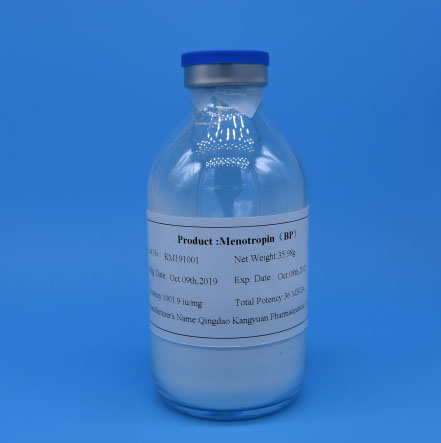Human menopausal gonadotropin (hMG) is a fertility drug administered by
doctors by injection. It is commonly used to increase the chances of pregnancy
for women who have fertility problems. These injections stimulate a woman's
ovaries to produce several eggs instead of just one. Sometimes, it can also be
used in men with low sperm counts, which is due to the body's...
Human menopausal gonadotropin (hMG) is a fertility drug administered by
doctors by injection. It is commonly used to increase the chances of pregnancy
for women who have fertility problems. These injections stimulate a woman's
ovaries to produce several eggs instead of just one. Sometimes, it can also be
used in men with low sperm counts, due to low levels of gonadotropin produced by
the body. Human menopausal gonadotropin injections contain two hormones that are
naturally produced by the pituitary gland: luteinizing hormone (LH) and follicle
stimulating hormone (FSH).

HMG injections stimulate a woman's ovaries to produce several eggs at once.
For women who cannot ovulate on their own, an hMG injection is an option.
Typically, patients receive postmenopausal gonadotropin injections before
undergoing another fertility treatment, such as in vitro fertilization. Because
hormone injections encourage more eggs to develop, doctors may harvest more
eggs, which can then be fertilized outside the womb. Another commonly used
treatment is intrauterine fertilization, where sperm is injected into the
uterus. Having multiple eggs to fertilize increases the chances of conception.
Human menopausal gonadotropin injections contain two naturally occurring
pituitary hormones: luteinizing hormone and follicle stimulating hormone
gonadotropin injections will begin early in a woman's menstrual cycle. Doctors
will inject it once a day for seven to 12 days. After treatment with the hMG
injection, the patient will receive an injection of human chorionic gonadotropin
(hCG). After the hMG stimulates the production of extra eggs, the hCG injection
triggers ovulation, meaning that these mature eggs are released into the
fallopian tube.
Menopausal gonadotropin injections will start early in women; While this
fertility treatment can help more than half of women become pregnant
successfully, about a third miscarry. Patients should be aware of the potential
risks before embarking on menopausal gonadotropin injections. In addition to the
risk of miscarriage, patients can sometimes miscarry and have ovarian
hyperstimulation syndrome. This may require bed rest, intravenous fluids, and
possibly hospitalization, as well as medical procedures to correct excess fluid
in the abdomen. The patient is regularly monitored throughout the injection and
blood tests and ultrasounds are performed to prevent this complication. HMG is
commonly used to increase the chances of pregnancy in patients with fertility
problems.
Human menopause gonadotropins may also cause other complications and side
effects. Men taking hMG may notice breast enlargement, which is temporary.
Abdominal pain and headaches are also possible. Women are more likely to develop
enlarged ovaries. Multiple pregnancies are also more likely, with a higher risk
than single pregnancies. In addition to the possible risk of miscarriage,
patients may sometimes be susceptible to ovarian hyperstimulation syndrome. Side
effects of human menopausal gonadotropins may include abdominal pain.